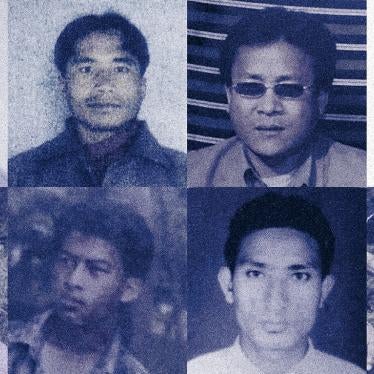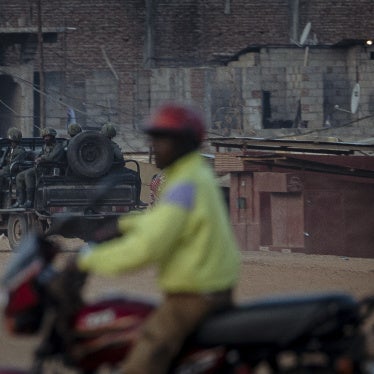(New York) –The Nepali government should immediately suspend the promotion of Kuber Singh Rana to the rank of Nepal’s Inspector General of Police due to his alleged involvement in human rights abuses, until the investigation and any subsequent prosecution into his involvement has been fully and finally concluded, Human Rights Watch and the International Commission of Jurists said today.
Rana is the subject of ongoing criminal investigations ordered by the Supreme Court in February 2009 into the October 2003 enforced disappearance and extrajudicial killings of five students from Dhanusha district in Nepal’s southern plains.
The Government of Nepal promoted Rana from his previous post of Assistant Inspector General on September 13, 2012. That promotion violates both international standards applicable in Nepal which require the removal or suspension of those suspected of gross human rights violations and crimes under international law, until the completion of full investigations, with full respect for the due process rights of the suspects. It is particularly important that those being investigated are not occupying positions where they could influence the investigation or decision to prosecute.
“Not only does the government continue to ignore Supreme Court orders to investigate security officers who face serious charges of violations of human rights and humanitarian law, it is promoting those being investigated of in gross human rights violations to the highest ranks,” said Sam Zarifi, Asia director of the International Commission of Jurists.
The United Nations’ Declaration on the Protection of all Persons from Enforced Disappearances requires the suspension of alleged perpetrators “from any official duties during the investigation.” More specifically, the UN Principles on the Effective Prevention and Investigation of Extra-legal, Arbitrary, and Summary Executions clearly establish the duty of the State to remove “those potentially implicated”:
“from any position of control or power, whether direct or indirect, over complainants, witnesses and their families, as well as over those conducting investigations.”
“The allegations against Rana and those under his command in 2003 are very serious and backed by substantial evidence collected by Nepal’s National Human Rights Commission (NHRC) and domestic nongovernmental human rights groups,” said Brad Adams, Asia director at Human Rights Watch. “Suspending Rana’s promotion will block an alleged human rights abuser from using his influence to possibly delay investigations, intimidate witnesses and lawyers, and to destroy criminal evidence.”
The five students who were subject to enforced disappearance and killed in Nepal’s southern plains are Sanjeev Karna, Durgesh Labh, Jitendra Jha, Shailendra Yadav, and Pramod Mandal. Witnesses say they were arrested by a joint army-police operation on October 8, 2003, near Janakpur municipality in Dhanusha District. Rana was Chief of Police in Dhanusha district at the time of the incident. On January 29, 2008, the NHRC concluded its investigation, implicating Kuber Rana and others.
A Supreme Court order on February 3, 2009, directed the police to investigate Rana and the other accused. A separate interim order by the Supreme Court on July 13, 2011, directed the Prime Minister to furnish monthly reports to both the Court and NHRC on the progress of the investigations. An exhumation carried out by the Nepal Police with NHRC assistance in 2010-11 uncovered five male bodies, blindfolded and shot summarily. Two years later, the Nepal Police have not reported any findings.
“A State actively entrenches impunity if it waits for a criminal conviction before barring promotion or suspending the active service of an implicated police official,” said Zarifi. “The Supreme Court of Nepal acknowledged this danger when it warned Rana in July 2011 not to ‘intervene and influence the investigation.’
Background:
At least 13,000 people were killed and over 1,300 subjected to enforced disappearance in Nepal’s decade-long conflict between government forces and Communist Party of Nepal (Maoist) combatants.
The fighting ended with the signing of the 2006 Comprehensive Peace Agreement consolidating a series of commitments to human rights. However, the government has yet to take steps to identify and prosecute those responsible for human rights violations during the fighting. International and local human rights groups have consistently decried the government’s efforts to side-step promises of justice and accountability and to promote alleged perpetrators, including Colonel Raju Basnet in July 2012.
Most recently, Amnesty International, Human Rights Watch, the International Commisison of Jurists and TRIAL issued an open letter to the President condemning a proposed executive ordinance that would empower a politically appointed commission to propose amnesties for perpetrators of war crimes and other serious human rights abuses.
“The move to promote Rana to Nepal’s highest police rank, combined with the government’s proposed amnesty ordinance, demonstrates its apparent determination to institutionalize impunity for serious crimes,” said Adams. “Rana’s promotion serves only to shield alleged human rights abuse perpetrators, undermine rule of law and deny victims’ long-overdue redress.”








